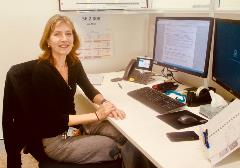Clinical audit a key CPD activity for paediatrician
Date published:
22 Jan 2019
Medical Board of Australia (MBA) changes to how Fellows undertake Continuing  Professional Development (CPD) come into effect over the next few years. The RACP is preparing Fellows for these changes by updating its MyCPD Framework from 2019, to reflect the direction the MBA is heading with its changes.
Professional Development (CPD) come into effect over the next few years. The RACP is preparing Fellows for these changes by updating its MyCPD Framework from 2019, to reflect the direction the MBA is heading with its changes.
As the new MyCPD Framework comes into effect, Fellows incorporating the changes into their practice and lifestyles speak to us about their approaches to CPD.
Associate Professor Sue Skull is a consultant paediatrician, Department of Clinical Research and Education Deputy Director and Head of the Research Education Program at Perth Children’s Hospital. She answered our CPD questions.
Why is CPD important to you?
As a part-time outpatient clinician who has a major focus in research education, keeping across developments in medical practice is essential to me. The annual CPD review allows me to look at my whole practice in paediatrics – both in my own immediate environment and more widely to focus on my general knowledge and performance.
What are some of the CPD activities you choose to do and why?
I’m a passionate educator. My current focus is on upskilling busy clinicians on how to conduct their research more effectively, efficiently and safely.
Clinical audits should underpin everything we do – to constantly evaluate and improve our day-to-day clinical practice.
An absolute priority for me is helping others choose worthwhile and focused research questions, and creating comprehensive resources for busy clinical staff through our research skills seminar program and workshops.
I am currently developing a clinical audit handbook, I represent our department in reviewing clinical audit submissions for approval, and in our department we also incorporate evidence-based journal article reviews into weekly meetings and keep a list of resources related to these. These activities provide long-term resources for clinical staff and keep me up-to-date.
How do you meaningfully plan your CPD activities and measure their outcomes?
I like to reflect on my previous year’s report and think about what I could do better the next year. I ask if there are areas where I could do more.
I continue to measure a whole range of activities such as training completed, meeting attendance, research activities, development of educational and training tools, supervision activities, committee work and so on.
I also like the behavioural markers embedded in the RACP’s Professionalism and Performance guide, to reflect upon areas outside core medical expertise.
Why is reviewing performance and measuring outcomes important?
The CPD process helps us aim for activity across a range of practice areas, which aids the development of currency, breadth and depth of knowledge to inform best quality clinical practice and general behaviours.